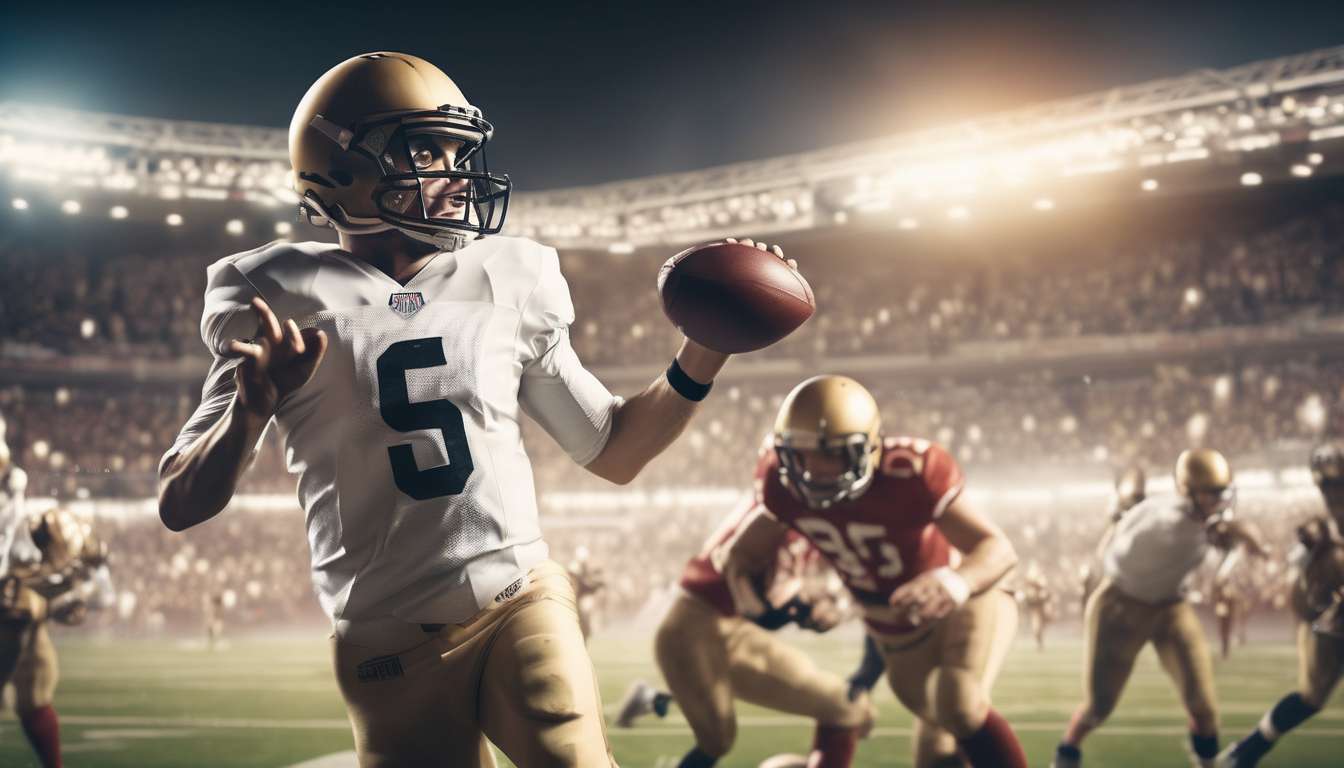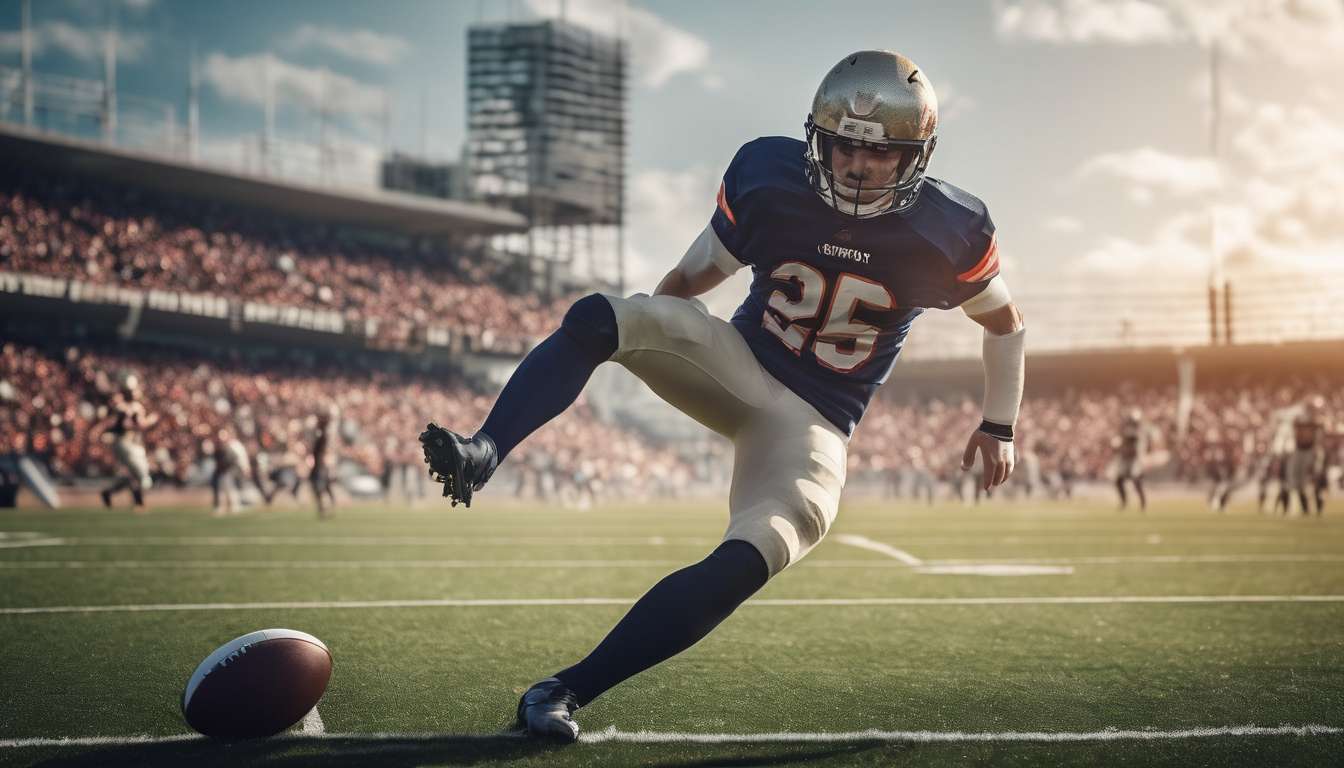As avid football enthusiasts, we often find ourselves captivated by the pivotal role quarterbacks play in shaping the outcome of a game.
Quarterback performance is more than just about throwing touchdowns; it’s about:
- Leadership
- Decision-making
- The ability to adapt under pressure
Every pass, every play, and every strategic decision can sway the momentum of a game, making quarterbacks the linchpins of their teams.
Through meticulous analysis of:
- Game statistics
- Performance metrics
we aim to unravel the intricate dynamics of how quarterbacks influence game outcomes.
Together, we will explore the various facets that contribute to a quarterback’s effectiveness, from:
- Their physical prowess
- Mental acuity
- Synergy with teammates
As we delve into this fascinating world, we invite you to join us in discovering how these athletes not only drive their teams to victory but also redefine the essence of the game itself.
Dominance in Key Performance Indicators
Quarterbacks often dominate key performance indicators like completion percentage, touchdown-to-interception ratio, and passer rating, revealing their crucial role on the field. These metrics are not just about numbers; they set the tone for game outcomes and create unforgettable moments that fans cherish.
The performance of a quarterback can be broken down into several key areas:
-
Completion Percentage: Quarterbacks work tirelessly to improve this, aiming for that perfect spiral connecting with receivers.
-
Touchdown-to-Interception Ratio: Achieving a high ratio is a triumph shared by all, often indicating a victory for the team.
-
Passer Rating: Although complex, it reflects their overall effectiveness and decision-making skills, especially crucial in tight game situations.
When we watch a quarterback throw precise passes, the excitement and anticipation ripple through the stands, bringing fans together.
The success of our team’s quarterback is a shared experience, with their achievements impacting game outcomes significantly. We feel a sense of pride and unity, knowing that their success is our success.
Influencing Momentum Shifts
Momentum Shifts and Team Energy
When our quarterback makes a crucial play, it can shift the momentum and energize the entire team and fan base. We’ve all felt that electric charge in the stadium when a perfectly thrown pass threads through defenders, landing flawlessly in the receiver’s hands.
This isn’t just a boost in spirit—it’s a strategic advantage that can alter game outcomes. A quarterback’s performance in these pivotal moments is vital, turning the tide in our favor and fostering a sense of unity and belief among us.
The Shared Experience of Football
We understand that football is more than just a game; it’s a shared experience. Our quarterback’s ability to influence momentum shifts speaks volumes about their leadership and skill. Each play executed with precision reflects on the entire team’s synergy.
As supporters, we share in these highs, knowing that each successful play brings us closer to victory. This connection fuels our collective passion, showcasing how a quarterback’s performance can truly shape the narrative of a game.
Strategic Decision-Making on Field
Every play requires quick and calculated decisions that can make or break our chances of success on the field. As quarterbacks, we understand that our performance directly influences game outcomes.
Key Abilities:
- Our ability to read the defense
- Anticipate their moves
- Adapt our strategy in real-time
We rely on our instincts and preparation, but also on the trust we’ve built with our teammates. This shared understanding allows us to execute plays smoothly and effectively under pressure.
In critical moments, we must:
- Assess risk and opportunity
- Decide between a short, safe pass or a deep throw
Each decision impacts not just the current play but the momentum of the game. Our strategic choices can:
- Energize the team and fans
- Create a sense of unity and purpose
We’re not just making decisions for ourselves; we’re shaping the game’s narrative and striving for victory together. This ensures our efforts resonate with everyone involved.
Team Leadership and Cohesion
In our role as leaders, we foster team cohesion by building trust and maintaining open communication on and off the field.
As quarterbacks, we understand that our performance is not just about individual stats; it’s about how we inspire and unite our team toward a common goal. When we communicate effectively, we create an environment where every player feels valued and motivated, directly impacting game outcomes.
We know that trust among teammates is crucial. By leading by example, we show commitment and dedication, encouraging others to do the same. Regular team meetings, feedback sessions, and casual interactions help us maintain this trust.
When we’re transparent about strategies and openly discuss our game plan, everyone feels included and aligned.
Our shared experiences during training and games strengthen our bond.
- We celebrate small victories together.
- We learn from setbacks, enhancing our collective resilience.
Ultimately, our cohesive team spirit and leadership as quarterbacks drive us toward success on the field.
Adaptability in High-Stress Situations
In high-stress situations, quarterbacks adapt quickly by:
- Staying focused
- Maintaining a clear mind
- Making decisive plays
Our performance under pressure significantly influences game outcomes. We understand that:
- Our teammates and fans count on us to rise above the chaos and deliver results.
- This shared trust creates a sense of belonging and unity on the field.
When the clock is ticking and stakes are high, our ability to:
- Read the defense
- Make split-second decisions
becomes crucial.
Our adaptability is tested in these moments, and our confidence stems from preparation and experience. We embrace the challenge, knowing that each situation is an opportunity to lead and inspire our team.
By staying composed, we can:
- Turn potential setbacks into triumphs
- Positively impact game outcomes
Our collective determination and grit bind us together, reinforcing our belief that even when the pressure mounts, we can adapt and overcome, ensuring our performance reflects our true potential.
Physical Skills and Athleticism
Strong physical skills and athleticism give us the edge needed to excel on the field. As quarterbacks, our performance directly influences game outcomes, and possessing these attributes sets us apart. Our ability to swiftly weave through defenders, launch precise passes, and maintain balance under pressure stems from our physical prowess. This isn’t just about raw strength; it’s about agility, speed, and coordination working in harmony.
When we harness these skills, we create opportunities for our team, turning potential plays into actual points. The camaraderie among us thrives because we share a common commitment to honing these abilities. Our athleticism doesn’t just elevate individual performance; it boosts team morale and unity, fostering a sense of belonging.
We all understand that a quarterback’s physical skills are foundational. They allow us to:
- Execute plays effectively.
- Adapt to dynamic field conditions.
- Ultimately influence game outcomes.
Together, we celebrate the strength and agility that define our role and drive our success.
Cognitive Processing and Game Reading
Our success hinges on our ability to rapidly process information and read the game as it unfolds.
As quarterbacks, we’re not just athletes; we’re strategists and leaders. Our performance directly affects game outcomes, making cognitive processing and game reading essential skills. We need to:
- Anticipate defensive schemes.
- Adapt to unexpected changes.
- Make split-second decisions that can turn the tide in our favor.
In our community, we understand the pressure of these moments. Together, we refine our mental agility, ensuring each play is executed with precision. We rely on our instincts and preparation, trusting our judgment when the stakes are high. This shared experience binds us, creating a sense of unity and purpose.
Our collective effort to master cognitive processing elevates our game and strengthens our team’s bond. By focusing on this mental aspect, we set ourselves apart, ensuring that our performance consistently contributes to successful game outcomes. We’re more than players; we’re thinkers and achievers.
Impact of Quarterback-Receiver Chemistry
The synergy between us and our receivers can make or break a play, demonstrating how vital chemistry is in achieving success on the field. When we step onto the gridiron, we rely on a shared understanding and trust. This connection enhances our quarterback performance, influencing game outcomes significantly.
It’s about more than just knowing the playbook; it’s about anticipating each other’s moves and adapting on the fly. We all know the thrill of a perfectly executed pass, where the ball seems to glide effortlessly into the receiver’s hands. This isn’t just skill—it’s chemistry. Our collective efforts and mutual respect forge a bond that elevates our game.
When we’re in sync:
- Defenses struggle to predict our next move.
- We gain a strategic edge.
In our community, we thrive on this connection. It’s the heartbeat of our team spirit, driving us toward victory.
Let’s continue to nurture this chemistry, as it’s our secret weapon for outstanding game outcomes.
How do off-field activities and personal life affect a quarterback’s performance during games?
When considering off-field activities and personal life, it’s important to understand how these factors can impact a quarterback’s performance during games.
Balancing Personal and Professional Responsibilities:
- Maintaining a healthy balance between personal life and professional duties is crucial.
- Distractions off the field might affect a quarterback’s focus and preparation.
Prioritizing Mental Well-being:
- Quarterbacks should prioritize their mental health to ensure peak performance on game day.
- A focus on mental well-being helps in managing stress and maintaining concentration during games.
By addressing these aspects, quarterbacks can enhance their performance and contribute more effectively to their team’s success.
What role does a quarterback’s contract and financial incentives play in their on-field performance?
Financial Incentives and On-Field Performance
When it comes to a quarterback’s contract and financial incentives, these factors can significantly influence their on-field performance.
Motivating Factors:
- The pressure to perform well to secure future contracts or bonuses can serve as a motivating factor.
- Financial considerations drive a quarterback’s determination and dedication during games.
Impact on Performance:
- Motivated by potential earnings, quarterbacks may:
- Work harder
- Stay more focused
- Strive for success on the field
In essence, the financial aspects of a quarterback’s career can be a powerful motivator, pushing them to excel in their athletic performance.
How does media pressure and public perception influence a quarterback’s game strategy?
Game Strategy and External Influences
When it comes to game strategy, media pressure and public perception can heavily influence a quarterback’s decisions on the field. These external factors can impact:
- Play calling
- Decision-making
- Overall performance during games
Team Dynamics and Expectations
As a team, we often feel the weight of expectations and scrutiny from fans and the media. This pressure can be challenging, but it’s crucial for us to:
- Stay focused on our game plan.
- Not let external pressures dictate our actions on the field.
By maintaining this focus, we can better manage the influences that come from outside the team, ensuring that our strategy and execution remain aligned with our goals.
Conclusion
In conclusion, the quarterback’s performance significantly influences game outcomes.
From dominating key performance indicators to:
- Driving momentum shifts
- Showcasing adaptability under pressure
Their leadership and skills play a pivotal role in shaping the team’s success.
With a combination of:
- Physical prowess
- Strategic decision-making
- Strong chemistry with receivers
Quarterbacks are not just players on the field, but leaders who can determine the course of a game.




